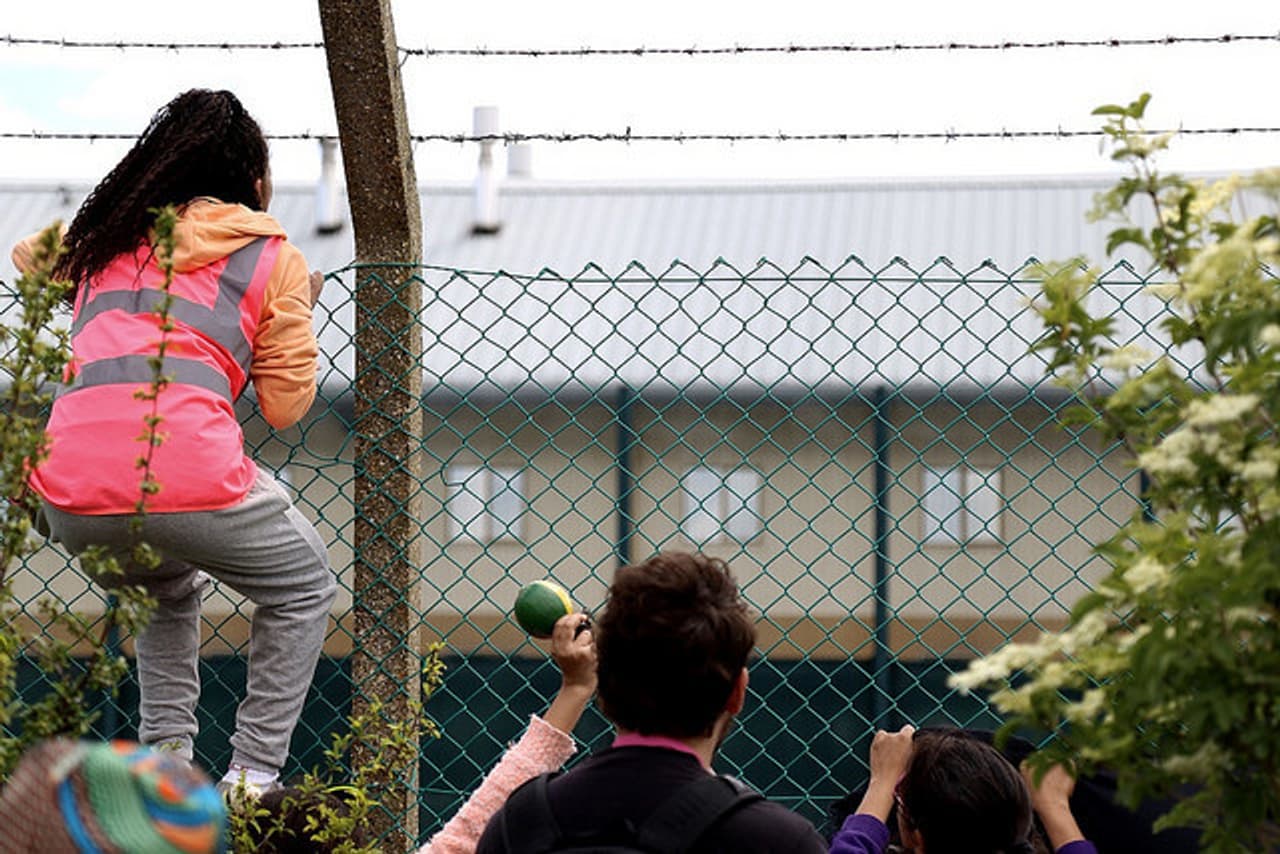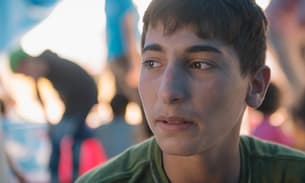
Vulnerable children locked up in immigration detention centres for adults due to Home Office blunders
Protest at Yarl’s Wood detention centre, June 2015 (Credit: Wasi Daniju)
Children fleeing the horrors of war in countries such as Syria and Afghanistan are being wrongly classified as over-18 and locked up by immigration officers in adult detention centres in breach of Government policies and legal guidelines.
The Bureau of Investigative Journalism has found that UK border and asylum officers are sending teenagers as young as 14 straight to adult detention centres despite clear evidence they are children and without referring their cases to social services, as guidelines dictate in such circumstances.
Five children have been found in the notorious Yarl’s Wood detention centre since the start of the year, the Bureau has established. Other figures released by the Refugee Council today show at least 127 minors have been found classified as adults in UK detention since 2010.
In May that year then deputy prime minister Nick Clegg announced the end of child detention in the UK, meaning children could only be held in specific, child-friendly facilities – and only then for a maximum of seven days.
However, the Bureau has discovered that scores of children are slipping through the net to be mistakenly assessed as adults by Home Office staff and then left for months in conditions that many have described as “distressing” and “scary”. Lawyers believe these numbers are merely the tip of the iceberg.
Experts now want Government policy to change to ensure all those who claim to be children undergo a lawful and more thorough age assessment from social services.
Judith Dennis from the Refugee Council said: “This is clear evidence that immigration officials are getting it wrong and there are no safeguards in place. We really don’t think immigration officials should ever be assessing people’s ages – the stakes are too high. Everyone who claims to be a child should have a timely, sensitive, lawful age assessment carried out by social workers.”
Mistakes are happening because decisions on age are being made by wary immigration officers based on individuals’ appearances. However, this method is particularly unreliable with boys who come from countries around the Middle East. The early onset of facial hair can make some look older than their European or east Asian counterparts.
Over the past three months, the Bureau has analysed data received from councils and other bodies under the Freedom of Information Act, examined critical reports from the Chief Inspector of Prisons, attended immigration tribunals and identified children caught up in the system.
“It is disturbing that mistakes in the assessment process are allowing some children to slip through the net, and it is vital that the Home Secretary gets a grip on this situation” –Lib Dem spokesperson
We have established that at a time of increasing workload in the asylum field only one in 10 Home Office asylum case workers – just 117 out of 1,159 – has enough child safety training to allow them to make decisions on children. We have also found the Chief Inspector of Prisons expressing concerns about processes.
Young people have described their experience in adult centres as traumatic, saying they were “scared”, “distressed” and had panic attacks. One Syrian 15-year-old said “there are no words to describe the horror of detention”. Another child reported being physically abused by the adults with whom he was held but who was too afraid of detention staff to report the assaults.
When asylum seekers arrive in the UK they are assessed by immigration officers in an initial screening interview. Guidelines state that those claiming to be children should be given the benefit of the doubt and referred to social services for an official age assessment. However, if their appearance or demeanour “very strongly suggests that they are significantly over 18 years of age”, officials are allowed to decide themselves and send them to a detention centre.
The Bureau has found that children as young as 14 have been assessed as adults, with immigration officers making decisions based on the person’s appearance with no apparent suggestion the person is “significantly over 18”.
In contrast, age assessments with social workers are more thorough, with the interview process lasting up to three hours and covering a child’s upbringing, educational history and other issues.
Government policy states anyone undergoing an age assessment should be first released from detention into the community and stay there until the results are known. But the Bureau has found through Freedom of Information requests that social workers have been sent to perform age assessments inside at least four adult detention centres in the last three years, in breach of guidelines.
Home Office blunders
The mistakes continue to happen. Government records show that at least five children have been detained in the notorious Yarl’s Wood centre in Bedfordshire since the start of 2015. Three of them were eventually classified as between 12 and 16 years old.
Procedures at Yarl’s Wood have also been criticised by the Chief Inspector of Prisons. In 2013, official inspectors wrote in a report on the centre that “some young detainees were age assessed by a chief immigration officer, rather than social services”.
Another finding was made after an inspection at Dover removal centre last year. Inspectors found a young Afghan asylum seeker had been detained after he had supplied a copy of his birth certificate, only to be then been told by the Home Office his evidence was insufficient. The Chief Inspector of Prisons concluded this was also incorrect.
Once inside an adult detention centre, children have struggled to challenge the Home Office’s decision. Many have been left waiting for months to be seen by councils’ child experts.
An inspection report of Tinsley House immigration centre, near Gatwick Airport, published last month found: “Disputes over age were not always resolved quickly which could result in prolonged detention.”
And the inspectors at Dover last year found that “detainees who claimed to be children were not always referred to social services for an age assessment”.
It is not just the conditions the under-18s must then endure – the failure to get access to an age assessment can have serious consequences on a young person’s asylum application.
The Bureau attended an immigration hearing in Feltham in February 2014 in which a young man from Afghanistan was asking for an adjournment on his asylum hearing, as he had been unable to get an age assessment. He claimed he was 15 years old and had an Afghan ID card showing the same.
The boy’s lawyers explained they had been trying for seven months to get an assessment done but the local authority had not found a slot. However, the judge was unsympathetic and in a pre-trial hearing he said: “The burden is on him [the applicant]. It seems there is no realistic prospect on the horizon that an age assessment will be carried out.” The proceedings continued as if he were an adult.
Lawyers now want a policy change.

Kamena Dorling, manager of the Migrant Children’s Project at Coram Children’s Legal Centre, a charity which works with asylum seeking children, said: “The Home Office’s practice of doing their own age assessments falls far short of what would be deemed a lawful assessment.”
Judicial decisions have outlined exactly what makes up an official age assessment, which must be performed by social workers, be in face-to-face meetings and decisions cannot solely be based on the appearance of the applicant.
“Once in detention it can be extremely difficult to secure a child’s release in order that an age assessment can be carried out. The impact of detention on children held as adults can be profound.”
The Refugee Council has calculated that 127 children have been found in adult detention since 2010. In the past 18 months, the charity has secured the release of 38 people from adult detention, 21 of whom have already been assessed as children, with the rest still awaiting a final decision.
Today, the Liberal Democrats called on the Home Secretary Theresa May to act urgently on the broader issue.
A spokesman said: “In government, Liberal Democrats changed the law to ensure the end of child detention. In the last five years of the Labour Government, over 7,000 innocent children were held in adult detention centres. Ending that scandal is one of the many achievements which we are incredibly proud to have delivered during our time in office.
“It is disturbing that mistakes in the assessment process are allowing some children to slip through the net, and it is vital that the Home Secretary gets a grip on this situation so that the historic changes delivered by the Liberal Democrats are not undone by poor management within the immigration system.”

Nick Clegg, Sarah Teather and Damian Green with members of Citizens UK. Crown copyright
Judicial Reviews
Incorrect age assessments are also costing the taxpayer in court and legal fees, the Bureau has discovered.
Those who dispute the age given to them by social services can take the decision to a judicial review – if they can find a lawyer. Although they are offered legal support at the time of their arrival, many are moved to detention centres in a different area and so lose touch with the lawyers.
Seventeen councils across England responded to Freedom of Information questions about legal challenges to their assessments. They revealed they had spent nearly £650,000 on 55 judicial reviews into age assessments in the past five years.
Hillingdon council, which receives high numbers of asylum seekers because Heathrow airport is in its borough, spent more than £250,000 fighting potentially flawed age assessments, in five cases over five years.
In one case last year an Iranian 16-year-old boy sued for damages after he was held for 24 days in adult detention. He had been mistakenly assessed as an adult after a flawed assessment from the Kent County Council but was later reassessed and released. He was awarded damages after a High Court judge found the social workers had failed to perform a full, legal assessment and that his detention had been unlawful.
A Home Office spokesperson said: “In the last Parliament, we ended the detention of children for immigration purposes. In doing so, we fundamentally changed the system to ensure that the welfare of the child is at the heart of every decision we make.
“In some cases, adults claim to be children in order to access the specialist support we offer – denying that support to those who genuinely need it.
“The Home Office works with a range of organisations – including the UNHCR, the Association of Directors of Social Services, and a number of children’s charities – to ensure that our age assessment process is fair and robust.”
Case study – Rauf Rauf (not his real name) is just one of the children caught up in this system. The 15-year-old boy claims he fled Syria after his father was taken by an extremist group and was smuggled to the UK, suffering physical and emotional abuse on the way. Finally he arrived in the UK last year, where he thought his ordeal would end. He was wrong. Rauf was found by police and taken to Harmondsworth detention centre, near Heathrow. He told immigration officials he was just 15 but they did not believe him. “I was held in a room with several adults and I was scared to go to sleep,” Rauf said. A social worker was called out but she too refused to believe his age. After eight days he was moved to another centre where he was seen by a doctor, and referred to the Refugee Council’s Children Section. After two weeks in detention the charity managed to get Rauf out earlier this year while he was being assessed again by social services. Finally his given age was accepted. “There are no words to describe the horror of detention: it was a prison. I struggled. I still have nightmares. I don’t know how someone can decide your age in 10 minutes. Detention is devastating,” Rauf said.
Case study – Fawad Fawad (not his real name) arrived in the UK in 2014 alone aged 15. He claims his family were killed by the on-going violence in Iraq. Immigration officials found him in Dover and immediately decided he was over 18. “I tried to explain that I was only a child but they didn’t listen. They said you shave you must be a grown man,” said Fawad. The teenager was moved to Dover detention centre (pictured). “The detention centre was a scary place. There were huge grey buildings inside tall metal fences. It was cold. I barely slept. There were so many adults of all ages, speaking so many languages and I felt so alone.” After three days in the centre he was released and moved to shared accommodation, but once again he was held with adults. “I did not feel safe,” Fawad remembers, “the place was dirty and dark. I often felt anxious and jumpy. I just wanted to be around people my own age.” After six months his solicitor managed to get him an age assessment with social services and authorities accepted that he was just 15. He was released earlier this year and has now managed to enrol in school and make friends his own age.
A version of this story was published in the Independent.
This story is part of on-going work exploring issues around the UK asylum system, if you have a tip or story please do get in contact [email protected]. You can follow Maeve on Twitter here.




